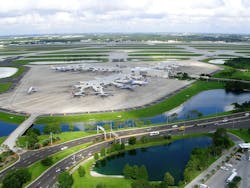June 08--Nearly a year's worth of talks have broken down between leaders of Orlando International Airport and its biggest, most important airlines over how much rent and other fees the carriers must pay -- costs that ultimately could be passed on to travelers.
Memos obtained by the Orlando Sentinel indicate that frustrated airport executives led by Director Phil Brown are moving to impose new, likely greater, rates on the airlines over their objections and have set a June 13 hearing date.
It is customary, but not mandatory, for the airport and the airlines to agree on charges. But more than a dozen airports, including ones in Boston, Phoenix and Oakland, recently have imposed rates on carriers when they could not reach agreement, according to Orlando International spokeswoman Carolyn Fennell.
Higher fees paid by the carriers could lead to increased ticket costs for people flying in and out of Orlando International, one of the largest and busiest airports in the country.
The Federal Aviation Administration may be forced to step in and mediate at least part of the dispute, which must be resolved by summer's end, when the airport's new budget takes effect. An FAA spokeswoman said in an email that the agency is not yet involved because airport officials have not formally approached them.
But the two memos, written on back-to-back days at the end of May, reveal both sides have contacted the FAA and told officials of their concerns.
Fennell would not comment on the memos, which are pointed in their criticisms of each side. Calls and emails to Southwest Airlines, the airport's largest carrier and lead negotiator for Orlando International's airlines, were not returned.
Key to the dispute is the airlines' firm opposition to a proposed $2.1 billion expansion at the airport.
The airlines sent off the first memo to airport board Chairman Frank Kruppenbacher on May 30. Covering five pages, it called the airport's plan for a second terminal, parking garage, train depot and related roads and utilities flawed and unneeded.
"No domestic or international carrier has voiced any desire to move their operation to the proposed, new south terminal," said the memo, which was collectively signed by the 14 busiest airlines at the airport.
Among the carriers opposing airport plans are Delta, Southwest, JetBlue, United, British Airways, Virgin Atlantic and CopaAirlines.
The airport memo written by Brown fired back, saying that following the advice of the carriers "restrict[s] our ability to plan and accommodate growth, in favor of maintaining a lucrative financial arrangement that clearly benefits the signatory airlines, while forcing the traveling public to suffer a degraded level of service as airfares continue to rise."
Faced with a backlash from the carriers, airport officials have agreed to put off southern terminal discussions for a year, but they have insisted on spending $470 million building a new garage, people mover and train depot next to where the proposed terminal would be.
The scaled-down approach has garnered no airline support, either. It would be paid for with bonds and an extension of a $4.50 fee on every ticket in and out of Orlando International. Called the passenger facility charge, the fee can be levied for a variety of airport improvements and is set to expire in 2019.
The FAA must approve the charge and the projects on which the money is spent.
The carriers' memo called the airport's threat to raise rates without their approval "an extreme [step] that is viewed very unfavorably by airlines representing 95 percent of the operations at the GOAA [Greater Orlando Aviation Authority]."
One of the bigger disagreements is over the split of surplus funds collected annually at the airport. Right now, the airport keeps 75 percent and gives 25 percent to the airlines. During the past four years, according to the airline memo, the airport has kept $199 million, with $61 million going to the carriers.
Now, the airport wants 80 percent of the surplus, in part to help offset the loss of income from the dwindling amount of space the carriers are leasing. About 40 percent of the rentable space at the existing terminal is vacant, in part because of contraction within the industry and the continual push by carriers to reduce expenses.
The airlines point to the unused space and the fact that overall travel at the airport essentially is at 2007 levels as reasons to oppose the expansion plans.
But airport officials say more passengers are on the way, according to their projections. It is crucial, the airport memo said, to have bigger, better facilities in place for the future. They say the quality of service will drop dramatically once the yearly passenger count hits 45 million, more than 9 million more than last year.
"The quality and level of service for the leisure destinations in Central Florida is recognized worldwide," the airline memo said. ""That is a standard that we will not easily abandon."
[email protected] or 407-420-5444
Copyright 2013 - Orlando Sentinel

